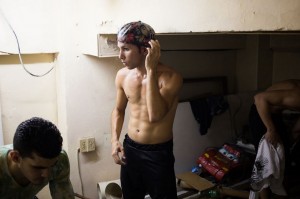
Johnny Simon and Rebecca Sanchez, who have been focusing on Cuba’s shifting political, cultural and social sands for MSNBC, have taken a snapshot of LGBT life in an interesting, albeit truncated, piece this week. “Though same-sex relationships were technically decriminalized in 1979,” they write, “it wasn’t until 1993 that Fidel Castro publicly stated his opposition to policies against LGBT people. He said that he had come to understand homosexuality as natural and apologized for the many years of maltreatment under his government.” (Cuba has allowed openly gay servicemembers since 1993, one year before President Clinton signed the now defunct Don’t Ask, Don’t Tell or DADT legislation that forbade the very same thing. Cuban law prevents discrimination in employment based on sexual orientation.)
But the history of the LGBT community, both in pre- and post-revolutionary Cuba, is one of ostracism, harassment and, during its darkest days, internment camps. Homosexuality was seen as a construct of capitalism’s wicked ways and in order to fulfill the goals of the Revolution, one could only do so as a heterosexual.
But according to Simon and Sanchez, the LGBT community, as evidenced by their nightlife, is spilling over into the realm of public acceptance. They write: “Regular gay-oriented parties, which started to pop up a little more than five years ago, are held in state-run clubs, but, technically listed as “audio-visual projects,” are not themselves state-run.” Three of the most popular are Las Vegas, Karabali and Echeverria
The community has also found a voice in Mariela Castro, President Raul Castro’s sister, who has traveled the world over as both an avowed feminist and defender of LGBT rights. In 2005 she proposed a project to allow transgender people to receive sex reassignment surgery and change their legal gender. The measure became law in June 2008 which allows sex change surgery for Cubans without charge. She is currently the director of the Cuban National for Sex Education.
“Today, the National Center for Sex Education leads various educational campaigns on LGBT issues. Programs to battle homophobia include HIV education, school classes for students beginning at the age of five and a televised soap opera featuring gay, lesbian and HIV positive people.”
As tourism increases and exposure to the outside world continues to grow, many in the LGBT community remain optimistic about their own personal revolutions.











